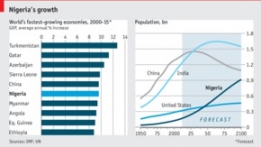At this point, Saddam Hussein, the butcher of Baghdad comes to mind. The whole world knows him and others of his ilk, without any need of any analysis whatsoever. He may have been holding the Quran in his left hand during his trial, but let's say that he was already condemned before his trial.
Q: Are you not being unduly hard, "rigorous" about this newspaper reportage?
Not that I have any inclination to agree or be in agreement with the aptness of the adjective as befitting the Gooduck Jonathan regime - but - since it is not question of "pre-determination", concerning "the independence required of the analyst" – you may be exasperated all you want, but does it make any difference whether the "woeful" comes at the beginning or the end (conclusion) of the analysis? It could prejudice the reader if it appears at the beginning – as it does coming in the second paragraph of this popular newspaper write up "He won a fair election last year against a woeful opponent", but if the evidence supports the aptness of the description, then on which basis do you ask "How can one have faith in an analysis that uses such adjectives to describe characters that the writer is supposed to be analyzing?"
Of course it would be a different matter altogether if one of the ICC judges were to apply the same adjective to describe the Ivory Coast's ex-president Laurent Gbagbo at the Hague – before the summing up, just before he/she passes a final government.
I was only asking.
Cornelius
On Friday, 29 January 2016 16:47:42 UTC+1, John Mbaku wrote:
"He won a fair election last year against a woeful opponent"Woeful opponent??? How can one have faith in an analysis that uses such adjectives to describe characters that the writer is supposed to be analyzing. Where is the rigor? Where is the independence required of the analyst?On Fri, Jan 29, 2016 at 3:15 AM, Oluwatoyin Adepoju <oluwas...@gmail.com> wrote:------------ Forwarded message ----------
From: therea...@yahoo.com [AfricanWorldForum] <AfricanW...@yahoogroups.com >
Date: 28 January 2016 at 20:39
Subject: [AfricanWorldForum] The Economist: President Muhammadu Buhari is repeating an economic error he made as dictator 30 years ago
Nigeria's economy
Hope the naira falls
President Muhammadu Buhari is repeating an economic error he made as dictator 30 years ago
Jan 30th 2016
"GIVE me lucky generals," Napoleon is supposed to have said, preferring them to talented ones. Muhammadu Buhari, a former general, has not had much luck when it comes to the oil price. Between 1983 and 1985 he was Nigeria's military ruler. Just before he took over, oil prices began a lengthy collapse; the country's export earnings fell by more than half. The economy went into a deep recession and Mr Buhari, unable to cope, was overthrown in a coup.
Now he is president again. (He won a fair election last year against a woeful opponent; The Economist endorsed him.) And once again, oil prices have slumped, from $64 a barrel on the day he was sworn in to $32 eight months later. Growth probably fell by half in 2015, from 6.3% to little more than 3% (see article). Oil accounts for 70% of the government's revenues and 95% of export earnings. The government deficit will widen this year to about 3.5% of GDP. The currency, the naira, is under pressure. The central bank insists on an exchange rate of 197-199 naira to the dollar. On the black market, dollars sell for 300 naira or more.
Advertisement
Instead of letting the naira depreciate to reflect the country's loss of purchasing power, Mr Buhari's government is trying to keep it aloft. The central bank has restricted the supply of dollars and banned the import of a long list of goods, from shovels and rice to toothpicks. It hopes that this will maintain reserves and stimulate domestic production.
When the currency is devalued, all imports become more expensive. But under Mr Buhari's system the restrictions on imports are by government fiat. Factory bosses complain they cannot import raw materials such as chemicals and fret that, if this continues, they may have to shut down. Many have turned to the black market to obtain dollars, and are doubtless smuggling in some of the goods that have been banned.
Nigerians have heard this tune before. Indeed, Mr Buhari tried something similar the last time he was president. Then, as now, he resisted what he called the "bitter pill" of devaluation. When, as a result, foreign currency ran short, he rationed it and slashed imports by more than half. When Nigerians turned to the black market he sealed the country's borders. When unemployment surged he expelled 700,000 migrants.
Barking orders at markets did not work then, and it will not work now. Mr Buhari is right that devaluation will lead to inflation—as it has in other commodity exporters. But Nigeria's policy of limiting imports and creating scarcity will be even more inflationary. A weaker currency would spur domestic production more than import bans can and, in the long run, hurt consumers less. The country needs foreign capital to finance its deficits but, under today's policies, it will struggle to get any. Foreign investors assume that any Nigerian asset they buy in naira now will cost less later, after the currency has devalued. So they wait.
Those who fail to learn from history...
Mr Buhari's tenure has in some ways been impressive. He has restored a semblance of security to swathes of northern Nigeria that were overrun by schoolgirl-abducting jihadists. He has won some early battles against corruption. Some of his economic policies are sound, too. He has indicated that he will stop subsidising fuel and selling it at below-market prices. This is brave, since the subsidies are popular, even though they have been a disaster (the cheap fuel was often sold abroad and petrol stations frequently ran dry). If Mr Buhari can find the courage to let fuel cost what the market says it should, why not the currency, too? You can forgive the general for being unlucky; but not for failing to learn from past mistakes.
Comments (8) Load more postsAdvertisement
Readers' comments
Sent from my BlackBerry 10smartphone.
__._,_.___
Reply via web post • Reply to sender • Reply to group • Start a New Topic • Messages in this topic (1)
.
 __,_._,___
__,_._,___
Listserv moderated by Toyin Falola, University of Texas at Austin
To post to this group, send an email to USAAfric...@googlegroups.com
To subscribe to this group, send an email to USAAfricaDial...@googlegroups.com
Current archives at http://groups.google.com/group/USAAfricaDialogue
Early archives at http://www.utexas.edu/conferences/africa/ads/index. html
---
You received this message because you are subscribed to the Google Groups "USA Africa Dialogue Series" group.
To unsubscribe from this group and stop receiving emails from it, send an email to usaafricadialo...@googlegroups.com .
For more options, visit https://groups.google.com/d/optout .
--JOHN MUKUM MBAKU, ESQ.
J.D. (Law), Ph.D. (Economics)
Graduate Certificate in Environmental and Natural Resources Law
Nonresident Senior Fellow, The Brookings Institution
Attorney & Counselor at Law (Licensed in Utah)
Brady Presidential Distinguished Professor of Economics & John S. Hinckley Fellow
Department of Economics
Weber State University
1337 Edvalson Street, Dept. 3807
Ogden, UT 84408-3807, USA
(801) 626-7442 Phone
(801) 626-7423 Fax
Listserv moderated by Toyin Falola, University of Texas at Austin
To post to this group, send an email to USAAfricaDialogue@googlegroups.com
To subscribe to this group, send an email to USAAfricaDialogue+subscribe@googlegroups.com
Current archives at http://groups.google.com/group/USAAfricaDialogue
Early archives at http://www.utexas.edu/conferences/africa/ads/index.html
---
You received this message because you are subscribed to the Google Groups "USA Africa Dialogue Series" group.
To unsubscribe from this group and stop receiving emails from it, send an email to usaafricadialogue+unsubscribe@googlegroups.com.
For more options, visit https://groups.google.com/d/optout.


No comments:
Post a Comment